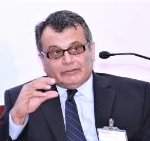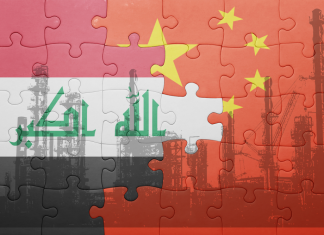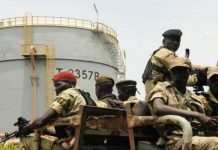
Iraq’s first draft budget for 2019 shows an overall increase in spending of 23% compared to 2018. Oil revenues still dominate sources of revenue, projected at 89% of government finances. The Iraqi government, with help from international creditors, has been aiming to increase non-oil sources of income. In 2019 however, non-oil income reduces by IQD 2.65 tr ($ 2.24 bn), or a decline of 18%.
Spending on energy, security and defense as well as social services remains a priority ahead of other sectors. Notably, the state’s planned spending on capital projects will grow by 32% and liberated provinces are included again in planned financial allocations after years of war, an important progression on 2018. However, Iraq’s greatest challenge of reducing its operational expenditure is still unresolved as it expands by 21% in 2019 and dominates 75% of total expenditure. This will of course leave the country extremely vulnerable to another fall in oil prices.
While the oil price assumption for 2019 has increased by $10 per barrel compared to last year, reflecting expectations of favorable oil export revenues, the planned deficit has almost doubled. However, with oil prices touching the $80 per barrel mark, it is reasonable to expect a surplus similar to that of 2018. The majority of the country’s oil exports are handled through the southern corridor that operates at almost full operational capacity given infrastructural limitations. Our analysis looks broadly at oil price forecasts for 2019 as well as a breakdown of bottlenecks and challenges to increased exports countrywide.
In light of these likely revenue gains, we provide an overview of Iraq’s reconstruction and service delivery needs in key sectors. Of particular note, Iraq’s upcoming government will be faced with a tremendous electricity provision challenge given a current shortfall of at least 7.5 GW during peak summer demand. We provide an overview of this sector and efforts to address this shortfall from the supply and demand side, including attempts to liberalise, modernise and restructure the sector. We also address the shortfall in education capital expenditure which has suffered during the “double shock” of the 2014-17 conflict and oil price collapse. We provide an overview of how expenditure in this sector is heavily weighted towards operational expenditure, in addition to illustrating this general trend across multiple sectors, despite a pressing need for new infrastructure.
In the national picture, we address the changing picture of fiscal federalism in Iraq. Broadly, southern provinces will see greater allocations with Basrah, Maysan and Thi Qar gaining 60%, 35% and 22% in total allocations respectively. Promised petrodollar allocations for oil and gas producing provinces comprising 5% of the price per barrel (or 5% of oil refined per barrel or gas produced) are capped nationally at 1 trillion Iraqi dinars, or USD $840 million, while Baghdad will retain significant powers over how these funds are spent, following revised legislation on provincial powers. Combined, the three provinces of the Kurdistan Region of Iraq (KRI) gain 36% in allocations. Their share is based on the 12.67% population estimate used for budgeting for 2018, although this remains contested between Baghdad and Erbil. Lastly, allocations for the war affected provinces remain significantly lower, suggesting that either the federal government will oversee more reconstruction from ministry budgets or alternatively, reconstruction may continue to lag in 2019, with concerning long term security implications.
It remains to be seen therefore, whether these allocations in the budget for reconstruction and for key sectors will change in the coming months. How these issues are resolved with have a profound effect on the future configuration of Iraqi federalism.
Download Report








![Building Resilience? Iraq’s Economy and COVID-19 [Report]](https://iraqenergy.org/wp-content/uploads/2020/08/Building-Resilience-Iraq-economy-and-COVID-19-Report-Cover-356x364.jpg)









![Iraq’s Draft Electricity Law: What’s Right, What’s Wrong? [Report]](https://iraqenergy.org/wp-content/uploads/2018/11/electricity-wires-218x150.jpg)


